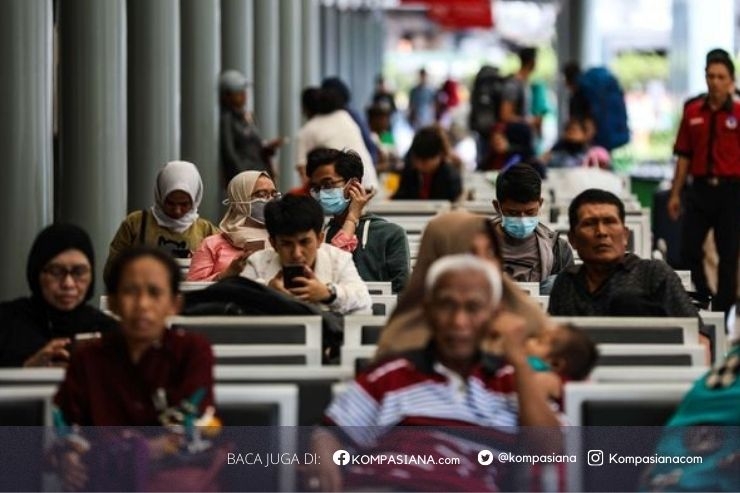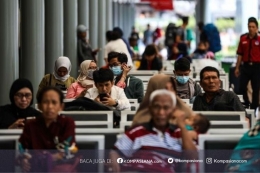Demonstrations against Jakarta, which transformed West Papua into three New Autonomous Regions (NAR) flared up in Papua: Sorong, Kaimana, Yahukimo, Wamena, Nabire, Jayapura, and Merauke. TNI/Polri officers brutally repressed the action and shot dead two demonstrators on the spot in Yahukimo, confronted the action in Sorong and Nabire and snapped, beat and looted demonstrators' equipment. Authorities do the same in Jayapura.
Meanwhile in Indonesia, anti-NAR demonstrations flared up in Ambon, Ternate, Manado, Bali, Kupang, Malang, Yogyakarta, and Jakarta. The majority of the demonstrations were initiated by Papuan students and students. In Yogyakarta, Papuan students and other solidarity groups have repeatedly demonstrated to demand that the expansion plan be canceled, the Special Autonomy Law (Otsus) be revoked, and the University of Gadjah Mada (UGM) be condemned as the intellectual actor-the Papua Task Force team that issued various studies supporting Jakarta's policies, including expansion. Demos in Jakarta, Malang, and elsewhere expressed the same sentiment and rejected Jakarta's role in pretending to know best what is best for Papua.
The West Papuan people reject the NAR because: First, the NAR is Jakarta's unilateral will, not the aspirations of the West Papuan people. The plan to divide West Papua into several NARs is an old agenda of the central government to silence demands for independence. A confidential document of the Department of Home Affairs Director General (DITGEN) Kesbang and Linmas June 2, 2000 in an official memorandum No. 578/ND/KESBANG/D IV/VI/2000 issued based on a radiogram report from the caretaker Governor of Papua No. 190/1671/SET/ dated June 3, 2000 reads:
"Operation plan for regional conditioning and development of communication networks in response to the political direction of Irian Jaya (now Papua) to become independent and break away from the Unitary State of the Republic of Indonesia. The place of operation is in all districts / cities in Irian Jaya Province to remote areas by accelerating the expansion of the Irian Jaya Province area and the formation of new districts / cities as needed."
Jakarta's coercive agenda was strongly protested by the West Papuan people, and Jakarta retaliated by assassinating Theys H. Elluay, who was then the national leader of the West Papuan people. 10 days after Theys' assassination, Jakarta unilaterally passed Law No. 21 of 2001 on Special Autonomy in November and then followed with the enactment of Presidential Instruction No. 1 of 2003 on the establishment of the DOB of West Papua Province. Although on November 11, 2004 the Constitutional Court ruled that West Papua Province had no binding legal force, due to Jakarta's ambition, the province has been forced to continue to this day.
The next fact is, towards the end of Otsus and the outbreak of protests throughout Papua condemning the racist treatment of reactionary groups and authorities against Papuan students in Surabaya in 2019. The people's movement then developed to demand political independence by occupying various government buildings and raising the Morning Star flag. In response, in addition to deploying thousands of TNI/Polri officers to Papua, Jakarta also recruited 61 people impromptu and named "Papuan figures" to suit their interests. These "Papuan figures" or rather puppet-masters were then organized to support Jakarta's wishes, such as Otus volume II and expansion.
October 30, 2019, Tito Karnavian admitted that the expansion of NAR in Papua was the result of an Intelligence study. Because of the results of this Intelligence study, of the 183 regions that proposed the expansion of NARs throughout Indonesia, all were ignored and Papua took precedence, even though Indonesia still imposes a Moratorium due to insufficient state financial capacity.
Second, this is the politics of "divide and rule" played by Jakarta. I Ngurah Suryawan in his book Jiwa Yang Patah notes that horizontal conflict in Papua is a product of the Indonesian government's creation via a circle of local elites / an extension of the Indonesian government's policies in Papua. The brutality of the Indonesian capitalist regime that has killed Papuan people and nature for 60 years has made Indonesia lose its authority in the eyes of the Papuan people. So in order to force Papua to stay with Indonesia, in addition to crazy military deployments, this profit-hungry capitalistic regime is also trying to break the unity of the Papuan people, and based on intelligence analysis, the most telling tool is regional expansion.
Many facts prove that the new division, as noted in Socrates S. Yoman's book Melanesian Ethnic Extermination, has divided Papuans by region, tribe and clan. The narratives of mountains and beaches, civil wars in Yalimo, Timika, Nduga, Yahukimo, Maybrat, South Sorong, and all the new regencies formed by Indonesia that are happening today are "horizontal conflicts" played by Jakarta. Even the analysis of the Institute for Policy Analysis of Conflict (IPAC) led by conflict researcher Sidney Jones, as concluded by Tirto.id: many expansions = many problems.
The division imposed by Jakarta is not an effort to build but an effort to break the unity of the Papuan people. Because Jakarta realizes that if the unity of the Papuan people is maintained, it will threaten them. So as Sendius Wonda said, the only way is to force division so that the unity of the Papuan people is destroyed, so that Indonesia will easily master and steal Papua's natural wealth.
Third, expansion in Papua does not fulfill the requirements and even threatens Papua's people and nature. The main requirements for NAR are population, financial capacity, and area. In Papua, the total population in the two provinces according to BPS 2020 data is not more than 6 million. 4.30 million people in Papua while 1.13 in West Papua. If the Jakarta argument is that the expansion of the government's efforts to improve the welfare of the Papuan people, is the problem of poverty only in Papua?
Obviously, even BPS 2021 data shows that extreme poverty is also on the island of Java. So if it is true that expansion is a "cure" for poverty, it should be East Java, with a population of nearly 50 million, that is being expanded, not Papua!
Next, financial capability. October 2020 Cenderawasih University released its study on the NAR plan in Papua. Uncen concluded that all regions in Papua did not meet the requirements for expansion, because the amount of PAD was not more than 50% and only hoped from central transfers. Uncen even concluded that the current districts such as Nduga, Mulia, Yahukimo, and Pegunungan Bintang should be merged back into the parent district. In West Papua, Maybrat, Arfak Mountains, Tambrauw, etc., should also be merged because the PAD is not more than 2%.
So expansion in Papua will only increase the burden on state finances and eventually the state debt will increase. The regime is keen on NAR Papua due to the bourgeoisie's strategy to legalize crazy investment in Papua to drain Papua's natural wealth under the pretext of "supporting development".
In addition, forced expansion in Papua will be followed by expansion of police structures and extra-territorial commands ranging from Kodam-Polda to Polsek and Koramil. In Papua I Made Supriatna reported the results of his study that 40 people are supervised by 1 military person. Expansion = strengthening of militarist restraints on Papuans' freedom of movement, speech and assembly.
Lastly: area. With the pretext that Papua is three times the size of Java, Papua can be divided into several DOBs. Expansion for whom, if the population is lacking? Clearly not for the people of West Papua, let alone OAP and indigenous peoples.
Fourth, expansion is not a solution to conflict. The Indonesian Institute of Sciences has concluded that there are four main problems related to Papua: the exclusion of the indigenous population, development failures, state violence and human rights violations, and the unfinished political status of Papua. The exclusion is clearly due to massive occupation from outside Papua, expansion will exacerbate this problem, not provide a solution.
The failure of development, 60 years of Indonesia occupying Papua, various programs that according to Indonesia build have been given. Then why haven't the Papuan people, who number no more than three million, prospered? Is it possible that development is not for Papuans but to facilitate capitalist and imperialist companies to exploit the Papuan people, extract natural resources, by destroying the environment? Filep Karma sarcastically emphasized at the April 2021 rejection rally that "Papuans are already a minority in two provinces, let alone making many provinces?"
As for violence and human rights violations, since Indonesia first occupied Papua on December 19, 1961 until 2000, 15 military operations have been carried out in Papua. According to Gemima Harvey 500,000 Papuans were killed during these operations. Even today, military operations are still ongoing in Nduga, Intan Jaya, Lani Jaya, Oksibil, Yahukimo, Maybrat, and almost all of Papua, where violence occurs every day. Amnesty International's latest report revealed that throughout 2018-2021 there were 95 civilians who were victims of unlawful violence by TNI / Polri officers. This is not the total number of victims since 2000. The main perpetrators are TNI / Polri. So the regime must withdraw the military, not NAR which actually adds troops.
Regarding political status, the struggle for Papua between Indonesia and the Netherlands which took place from the 1950s to the 1960s is the root of the Papuan conflict which continues to be debated and fought for by the West Papuan people to this day. Whereas December 1, 1961 the West Papuan people through the New Guinea Council declared the independence of West Papua.
The United States, eager to steal Papua's gold deposits in Timika, then acted as a mediator to bring the Dutch and Indonesians together without involving a single Papuan on August 15, 1962. The result was the New York Agreement, an agreement consisting of 29 articles that generally regulates the transfer of power from the Netherlands to the UN and then the UN to Indonesia and then Indonesia organizes the determination of the Papuan people's opinion (PEPERA). Article XVIII, especially parts a and d, regulates the election mechanism in PEPERA. Particularly article d emphasizes that those entitled to vote are indigenous Papuans, both men and women.
In 1969 PEPERA was held, and in accordance with Article XVIII section d all adult Papuans, or 800,000 at the time, should have been involved in voting. But in practice Indonesia only selected 1,025 people to vote. In the end, Indonesia won the PEPERA, or more precisely, the "raw deception" event.
This is the political status that Papuans continue to question to this day. The right of Papuans to self-determination has not been realized. So what the Indonesian government needs to do is organize free and honest elections for Papuans to express their opinions, or in the demands of the Papuan people called a refendum.
Follow Instagram @kompasianacom juga Tiktok @kompasiana biar nggak ketinggalan event seru komunitas dan tips dapat cuan dari Kompasiana. Baca juga cerita inspiratif langsung dari smartphone kamu dengan bergabung di WhatsApp Channel Kompasiana di SINI







